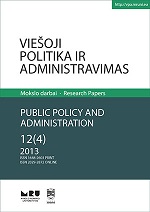Nusikalstamos veikos ir administracinio teisės pažeidimo atribojimo problemos: teisės pažeidimai, susiję su disponavimu narkotinėmis ar psichotropinėm
The Problematics of Distinction Between Crime and Administrative Offence: Offences Related to Disposal of Narcotic or Psychotropic Substances
Author(s): Darius PrankaSubject(s): Law, Constitution, Jurisprudence
Published by: Mykolas Romeris University
Keywords: crime; administrative offence; dangerousness; drugs and psychoactive substances
Summary/Abstract: The main problem of the article is how to separate Article 259 Part 2 of the Criminal Code of the Republic of Lithuania and Article 44 Part 1 of the Administrative Offences Code of the Republic of Lithuania. In spite of the fact that this problem appeared in the doctrine of criminal law and in courts’ practice quiet long time ago, it should be admitted that till now it has not been solved. This is the cause why this problem is topical. In author’s opinion, the topicality is bigger in the context of times, when the courts’ practice has changed. The article gives approval to this courts’ practice, which is different of earlier, when the main focus was concentrated on Article 9 of the Administrative Offences Code, which gives priority to criminal liability. After the analysis of the latest court’s decisions, it can be concluded that formal rules could not determine that crime or administrative offence was committed, but the biggest attention must be deflected to dangerousness of the offence. Every time there is a need to determine that crime or administrative offence was committed, a lot of various criteria must be analyzed, which describe the dangerousness of the offence: the amount and kind of drugs or psychoactive substances, the consequences of committing an offence, the place, purpose, intensity, duration and motivation of the acts. In spite of the large number of such criteria, according to the author’s opinion, the main attention should be given to the amount and kind of drugs or psychoactive substances. Other features should not have a significant value. However, the problematical situation has not been solved, although it became better than before. The next chapter of the article is focused on the most significant criteria that could have the greatest influence on the legislator while deciding to criminalize a certain act. Sustaining these criteria, the author doubts the criminalization of Article 259 Part 2 of the Criminal Code. According to these features, only two alternative acts of this Article are analyzed – “keeping” and “obtaining”, but it is noted that other acts could be assessed in the same way. Therefore, the author proposes decriminalize this crime and put this offence to the Administrative Offences Code. The author notes that there are some others ways to solve this problem, but, according to the author, this way is the best. The article is finished with the findings. It is suggested to pay an appropriate attention to dangerousness of an offence, when delimitating offences is needed. Also, a proposal is given to legislator concerned with the decriminalization of Article 259 Part 2 of the Criminal Code.
Journal: Viešoji politika ir administravimas
- Issue Year: 12/2013
- Issue No: 4
- Page Range: 1510–1523
- Page Count: 14
- Language: Lithuanian

